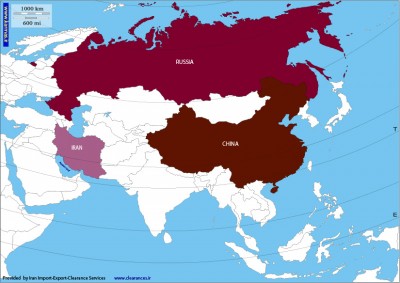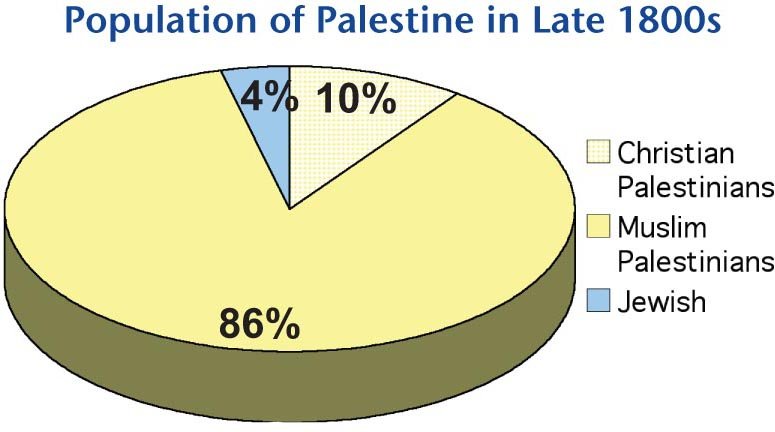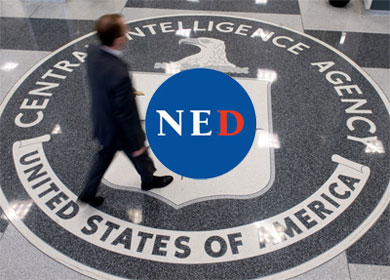
In 2006, Kremlin denounced the proliferation of
foreign associations in Russia, some of which would have participated in
a secret plan, orchestrated by the National Endowment for Democracy
(NED), to destabilise the country. To prevent a “colour revolution”,
Vladislav Surkov drew up strict regulation over these non-governmental
organizations (NGOs). In the West, this administrative framework was
described as a “fresh assault on freedom of association by Putin the
“Dictator” and his adviser”.
This policy has been followed by other States who in their turn, have been labelled by the international press as “dictators”.
The US government guarantees that it is working towards “promoting
democracy all over the world”. It claims that the US Congress can
subsidize NED and that NED can, in turn and wholly independently, help
directly or indirectly, associations, political parties or trade unions,
working in this sense anywhere in the world. The NGOs being, as their
name suggests, “non-governmental” can take political initiatives that
ambassadors could not assume without violating the sovereignty of the
States that receive them. The crux of the matter lies here: NED and the
network of NGOs that it finances: are they initiatives of civil society
unjustly repressed by the Kremlin or covers of the US Secret Services
caught red-handed in interference?
In order to respond to this question, we are going to return to the
origins and function of NED. But our first step must be to analyze
the meaning of this official US project: “exporting democracy”.
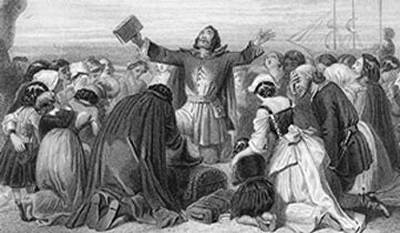
- The
puritans that founded the United States wanted to create a “radiant
city” whose light would illuminate the whole world. They considered
themselves the missionaries of a political model.
What Democracy?
The US, as a people, subscribes to the ideology of their founding
fathers. They think of themselves as a colony that has come from Europe
to establish a city obeying God. They see their country as “a light on
the mountain” in the words of Saint Mathew, adopted for two centuries by
most of their presidents in their political speeches. The US would be a
model nation, shining on top of a hill, illuminating the entire world.
And all other people in the world would hope to emulate this model to
reach their well-being.
For the people of United States, this very naïve belief implies
without more that their country is an exemplary democracy and that they
have a messianic duty to superimpose it on the rest of the world. While
Saint Mathew envisaged propagating faith exclusively through the
example of a righteous life, the founding fathers of the United States
thought of illumination and propagating their faith in terms of regime
change. The English puritans beheaded Charles I before fleeing to the
Netherlands and the Americas, then the patriots of the New World
rejected the authority of King George III of England, proclaiming the
independence of the United States.
Impregnated by this national mythology, the people of the United
States do not perceive their government’s foreign policy as a form of
imperialism. In their eyes, it is all the more legitimate to topple a
government that has the ambition to take the form of a model which is
different from theirs and thus evil. In the same way, they are
persuaded that due to the messianic mission that has been thrust upon
them, they have arrived to impose democracy by force in the countries
that they have occupied. For example, at school they learn that GIs
brought democracy to Germany. They do not know that history indicates
quite the opposite: their government helped Hitler to topple the
Republic of Weimar and set up a military regime to fight the Soviets.
This irrational ideology prevents them from challenging the nature of
their institutions and the absurd concept of a “forced democracy”.
Now, according to President Abraham Lincoln’s formula, “democracy is
the government of the people, by the people for the people”.
From this point of view, the United States is not a democracy but a
hybrid system where executive power is returned to the oligarchy, while
the people limit its arbitrary exercise through legislative and judicial
powers that can check it. Indeed, while the people elect Congress and
some judges, it is the states of the federation that elect executive
power and the latter appoints the high judges. Although citizens have
been called to determine their choice of president, their vote on this
matter only operates as a ratification, as the Supreme Court pointed out
in 2000, in Gore v. Bush. The US Constitution does not recognize that
the people are sovereign, because power is divided between them and a
federation of states, in other words, between the leaders of the
community.
As an aside, we observe that in contrast, the Russian Federation’s
Constitution is democratic – on paper at least. It declares: “the holder
of sovereignty and the sole source of power in the Russian Federation
is its multinational people.” (Title I, Ch. 1, art.3).
This intellectual context explains that the US supports its
government when it announces that it wants “to export democracy”, even
if, its own constitution signals that it is not one. But it is difficult
to see how it could export something it does not possess and does not
wish to have at home.
For the last thirty years, this contradiction has been supported by
NED and given specific form through destabilizing a number of States.
With a smile that a clean conscience blesses upon them, thousands of
activists and gullible NGOs have violated the people’s sovereignty.
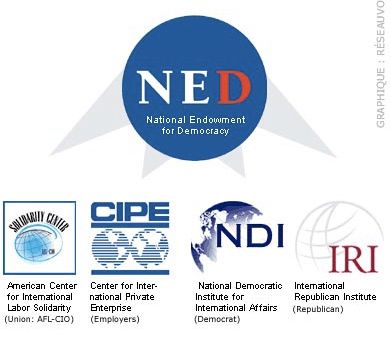
A Pluralist and Independent Foundation
In his famous speech on 8 June 1982 before the British Parliament,
President Reagan denounces the USSR as “the empire of evil” and proposes
to come to the aid of dissidents over there and elsewhere. He
declared:
“We need to create the necessary infrastructure for democracy: freedom
of the press, trade unions, political parties and universities. This
will allow people the freedom to choose the best path for them to
develop their culture and to resolve their disputes peacefully”.
On this consensual basis of the struggle against tyranny, a commission
of bipartisan reflection sponsored the establishment of NED at
Washington. This was established by Congress in November 1983 and
immediately financed.
The Foundation subsidizes four independent structures that
redistribute money abroad, making it available to associations, trade
unions and members of the ruling class, and parties on the right and
left. They are:

Free
Trade Union Institute (FTUI), today renamed American Centre for
International Labour Solidarity (ACILS), managed by the trade union
AFL-CIO;

Centre for International Private Enterprise (CIPE), managed by the US Chamber of Commerce;

International Republican Institute (IRI), run by the Republican Party;

National Democratic Institute for International Affairs (NDI), run by the Democratic Party.
Presented in this manner, NED and its four tentacles appear to be
anchored in civil society, reflecting social diversity and political
pluralism. Funded by the US people, through Congress, they would have
worked to a universal ideal. They would be completely independent of the
Presidential Administration. And their transparent action could not be a
mask for secret operations serving undeclared national interests.
The reality is completely different.
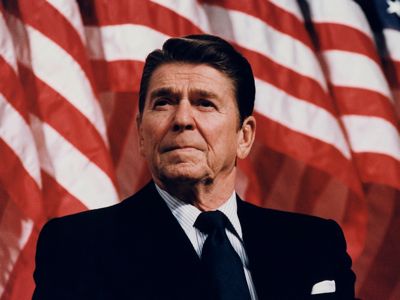
- In 1982, Ronald Reagan established NED in partnership with the United Kingdom and Australia to topple the “Empire of Evil”.
A Drama produced by the CIA, MI6 and ASIS
Ronald Reagan’s speech in London took place in the aftermath of
scandals surrounding revelations by Congressional Committees enquiring
into the CIA’s dirty-trick coups. Congress then forbids the Agency to
organize further coups d’etat to win markets. Meanwhile, in the White
House, the National Security Council (NSC) looks to put in place other
tools to circumvent this prohibition.
The Commission of Bipartisan Reflection was established prior to
Ronald Reagan’s speech, although it only officially received a mandate
from the White House afterwards. This means it is not responding to
grandiloquent presidential ambitions but precedes them. Therefore,
Reagan’s speech is only rhetorical dressing of decisions already taken
in principle, and meant to be implemented by the Bipartisan Commission.
The Chair of the Bipartisan Commission was the US Special
Representative for Trade, who indicates that she did not envisage
promoting democracy but, according to current terminology, “market
democracy”. This strange concept is in keeping with the US model: an
economic and financial oligarchy imposes its political choices through
the markets and a federal state, while parliamentarians and judges
elected by the people protect individuals from arbitrary government.
Three of NED’s four peripheral organizations were formed for the
occasion. However, there was no need to establish the fourth, a trade
union (ACILS). This was set up at the end of the Second World War even
though it changed its name in 1978 when its subordination to the CIA
was unmasked. From this we can extract the conclusion that the CIPE,
IRI and NDI were not born spontaneously but were engineered into being
by the CIA.
Furthermore, although NED is an association under US law, it is not a
tool of the CIA alone, but an instrument shared with British services
(which is why Reagan announced its creation in London) and the
Australian services. This key point is often glossed over without
comment. However, it is validated by messages of congratulations by
Prime Ministers Tony Blair and John Howard during the 20th anniversary
of the so-called “NGO”. NED and its tentacles are organs of an
Anglo-Saxon military pact linking London, Washington and Canberra; the
same goes for Echelon, the electronic interception network. This
provision can be required not only by the CIA but also by the British
MI6 and the Australian ASIS.
To conceal this reality, NED has stimulated among its allies the
creation of similar organizations that work with it. In 1988, Canada is
fitted out with a centre Droits & Démocratie, which has a special
focus first on Haiti, then Afghanistan. In 1991, the United Kingdom
established the Westminster Foundation for Democracy (WFD). The
functioning of this public body is modelled on NED: its administration
is entrusted to political parties (eight delegates: three for the
Conservative Party; three for the Labour Party; and one for the Liberal
Party and one for the other parties represented in Parliament). WFD has
done a lot of work in Eastern Europe. Indeed in 2001, the European
Union is equipped with a European Instrument for Democracy and Human
Rights (EIDHR), which arouses less suspicion than its counterparts. This
office is EuropAid, led by a high official as powerful as he is
unknown: the Dutchman, Jacobus Richelle.
Presidential Directive 77
When US parliamentarians voted for the establishment of NED on 22
November 1983, they did not know that it already existed in secret
pursuant to a Presidential Directive dated 14 January.
This document, only declassified two decades later, organizes “public
diplomacy” a politically correct expression to designate propaganda. It
establishes at the White House working groups within the National
Security Council. One of these is tasked with leading NED.
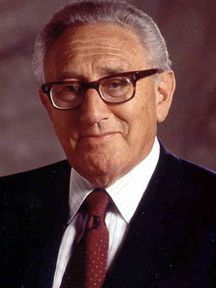
- Henry Kissinger, administrator of the NED. A “representative of civil society”?
Consequently, the Board of Directors of the Foundation is only a
transmission belt of the NSC. To maintain appearances, it has been
agreed that, as a general rule, CIA agents and former agents could not
be appointed to the board of directors.
Things are nonetheless no more transparent. Most high officials that
have played a central role in the National Security Council have been
NED directors. Such are the examples of Henry Kissinger, Franck
Carlucci, Zbigniew Brzezinski, or even Paul Wolfowitz; personalities
that will not remain in history as idealists of democracy, but as
cynical strategists of violence.
The Foundation’s budget cannot be interpreted in isolation because it
receives instructions from the NSC to lead action as part of vast
inter-agency operations. It merits mention that funds are released from
the International Aid Agency (USAID), without being recorded in NED’s
balance sheet, simply for “non-governmentalizing”. Furthermore, the
Foundation receives money indirectly money the CIA, after it has been
laundered by private intermediaries such as the Smith Richardson
Foundation, the John M. Olin Foundation or even the Lynde and Harry
Bradley Foundation.
To evaluate the extent of this programme, we would need to combine
the NED’s budget with the corresponding sub-budgets of the Department of
State, USAID, the CIA and the Department of Defense. Today, such an
estimation is impossible.
Nonetheless, certain elements we know give us an idea of its
importance. During the last five years, the United States has spent more
than one billion dollars on associations and parties in Libya, a small
state of 4 million inhabitants. Overall, half of this manna was released
publicly by the State Department, USAID and NED; the other half had
been secretly paid by the CIA and the Department of Defence. This
example allows us to extrapolate the US’s general budget for
institutional corruption that amounts to tens of billions of dollars
annually. Furthermore, the equivalent programme of the European Union
that is entirely public and provides for the integration of US actions,
is 7 billion euro per year.
Ultimately, NED’s legal structure and volume of its official budget
are only baits. In essence, it is not an independent organization for
legal actions previously entrusted to the CIA, but it is a window
through which the NSC gives the orders to carry out legal elements of
illegal operations.
The Trotskyite Strategy
When it was being set up (1984), NED was chaired by Allen Weinstein,
then by John Richardson for four years (1984-88), finally by Carl
Gershman (from 1998).
These three men have three things in common:

They are Jewish;

They were active in the Trotsky party, Social Democrats USA; and

They have worked at Freedom House.
There is a logic in this: hatred of Stalinism led some Trotskyites to
join the CIA to fight the Soviets. They brought with them the theory
of global power, by transposing it to the “colour revolutions” and to
“democratisation”. They have simply displaced the Trotsky vulgate by
applying it to the cultural battle analysed by Antonio Gramsci: power
is exercised psychologically rather than by force. To govern the
masses, the elite has to first inculcate an ideology that programmes
their acceptance of the power that dominates it.
The American Centre for the Solidarity of Workers (ACILS)
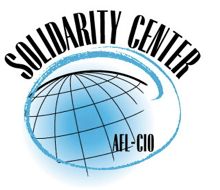
Known also as Solidarity Centre, ACILS, a trade union branch of NED,
is easily its principal channel. It distributes more than half the
Foundation’s donations. It has replaced the previous organizations that
served during the Cold War to organize non-communist trade unions in
the world, from Vietnam to Angola, by-passing France and Chile.
The fact trade unions were chosen to cover this CIA programme is a
rare perversity. Far from the Marxist slogan, “Proletariats from all
countries – unite”, ACILS brings together US working class trade unions
in an imperialism that crushes workers in other countries.
This subsidiary was led by Irving Brown, a flamboyant personality, from 1948 until his death in 1989.

- In
1981, Irving Brown places Jean-Claude Mailly as an assistant to André
Bergeron, the Secretary General of the Force Ouvrière (FO). The latter
will acknowledge financing its activities thanks to the CIA. In 2004,
Mailly becomes the Secretary General of the FO.
Some authors swear that Brown was the son of a white Russian, a
companion of Alexander Kerensky. What we know for sure, is that he was
an OSS agent, (i.e. an agent of the US intelligence service during the
Second World War); and he participated in establishing the CIA and
NATO’s Gladio network. However, he refused to lead it, preferring to
focus on his area of expertise, trade unions. He was based at Rome,
then Paris and never at Washington. So he had a significant impact on
Italian and French public life. At the end of his life, he also boasts
that he did not stop directing the French trade union, Force Ouvrière
behind the scenes, and that he pulled the strings of the Student trade
union UNI (where the following are active: Nicolas Sarkozy and his
ministers François Fillon, Xavier Darcos, Hervé Morin and Michèle
Alliot-Marie, as well as the President of the National Assembly, Bernard
Accoyer and the President of the majoritarian parliamentary group,
Jean-François Copé), and to have personally formed on the left, members
of a Trotsky-ite break away group which included Jean-Christophe
Cambadelis and the future Prime Minister Lionel Jospin.
At the end of the nineties, members of the confederation AFL-CIO
requested accounts of ACILS’s actual activity, while its criminal
character had been fully documented in a number of countries. One could
have thought that things would have changed after this great outpouring.
Nothing of the sort occurs. In 2002 and 2004, ACILS has participated
actively in a failed coup d’Etat in Venezuela to oust President Hugo
Chavez and in a successful one in Haiti in toppling Jean-Bertrand
Aristide.
Today, ACILS is directed by John Sweeney, the former president of the
confederation AFL-CIO, which itself also originates from the Trotskyite
Party - Social Democrats USA.
The Centre for International Private Enterprise (CIPE)
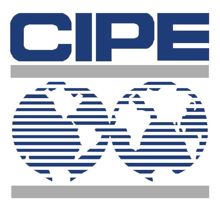
CIPE focuses on the dissemination of liberal capitalist ideology and the struggle against corruption.
The first success of CIPE: transforming in 1987 the European
Management Forum (a club of CEOs of big European companies) into the
World Economic Forum (the club of transnational ruling class). The big
annual meeting of the world’s economic and political who’s who in the
Davos Swiss ski resort contributed to creating a class membership that
transcended national identity.
CIPE makes sure that it does not have any structural ties with the Davos
Forum, and it is not possible – for the moment - to prove that the
World Economic Forum is an instrument of the CIA. On the contrary, the
heads of Davos would have much difficulty explaining why certain
political leaders have chosen their Economic Forum as the locus for acts
of the highest importance if there were not operations planned by the
US NSC. For example:

1988: it is at Davos – not the UN - that Greece and Turkey made peace.

1989:
it is at Davos that the two Koreas on the one hand held their first
summit at the ministerial level and the two Germany’s on the other hand
held their first summit on the reunification.

1992:
it is again at Davos that Frederik de Klerk and the freed Nelson
Mandela come together to present their common project for South Africa
for the first time abroad.

1994:
still more improbable, it is at Davos, after the Oslo Accord, that
Shimon Peres and Yasser Arafat come to negotiate and sign its
application to Gaza and Jericho.
The connection between Washington and the Forum is notoriously
through Susan K. Reardon, former director of the Association of
Professional Employees of the Department of State, having become
director of the Foundation of the US Chamber of Commerce which manages
CIPE.
The other success of the Centre for International Private Business is
Transparency International. This “NGO” was officially established by
Michael J. Hershman, an officer of US military intelligence. He is
furthermore, a CIPE director and today Head of Recruitment of FBI
informants as well as Managing Director of the private intelligence
service Fairfax Group.
Transparency International is first and foremost a cover for economic
intelligence activities by the CIA. It is also a media tool to compel
states to change their legislation to guarantee open markets.
To mask the origin of Transparency International, the CIPE makes and
appeal to the savoir-faire of the former press officer of the World
Bank, the neo-conservative Frank Vogl. The latter had put in place a
Committee of individuals that have contributed to creating the
impression that it is an association born of civil society. This
window-dressing committee is led by Peter Eigen, former World Bank
Director in East Africa. In 2004 and 2009, his wife was the SPD
candidate for the Presidency of the German Federal Republic.
Transparency International’s work serves US interests and cannot be
relied upon. Thus in 2008, this pseudo NGO denounced that PDVSA,
Venezuela’s public oil company, was corrupt; and on the basis of false
information, placed it last in its global rankings of public companies.
The goal was evidently to sabotage the reputation of a company that
constitutes the economic foundation of the anti – imperialist policy of
President Hugo Chavez. Caught in the act of poisoning, Transparency
International refused to respond to questions from the Latin American
press and to correct its report. Furthermore, it is astonishing when we
recall that Pedro Carmona, the CIPE correspondent at Venezuela, had
been briefly put in power by the USA, during a failed coup d’Etat in
2002 to oust Hugo Chavez.
To some extent, focussing attention on economic corruption enables
Transparency International to mask NED’s activities: corrupting the
ruling elite for Anglo-Saxon advantage.
The International Republican Institute (IRI) and the National Democratic Institute for International Affairs (NDI)
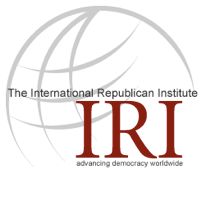
The goal of IRI is to corrupt the parties of the Right, while the NDI
deals with left wing parties. The first is chaired by John McCain, the
second by Madeleine Albright. So these two personalities should not be
considered ordinary politicians, a leader of the opposition and a
retired dean. Rather, as active leaders of the NSC programmes.
To contextualize the principal political parties in the world, IRI
and NDI have renounced their control over l’Internationale libérale and
l’Internationale socialiste. They have thus created rival organizations:
the International Democratic Union (IDU) and the Alliance for Democrats
(AD). The first is chaired by the Australian, John Howard. The Russian,
Leonid Gozman of Just cause (Правое дело) is its vice-president. The
second is led by the Italian Gianni Vernetti and co-chaired by the
Frenchman, François Bayrou.
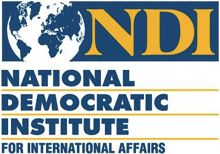
IRI and NDI are also supported also by political foundations linking
them to big political parties in Europe (six in Germany, two in France,
one in the Netherlands and another one in Sweden).
Furthermore, some
operations have been sub-contracted to mysterious private companies such
as Democracy International Inc which has organized the recent rigged
elections in Afghanistan.
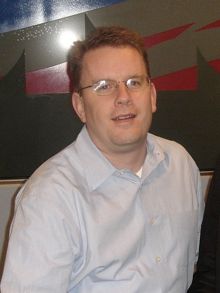
- Tom
McMahon: former vice head of Rahm Emanuel and currently head of NDI. He
came to France to organise the primaries of the Socialist Party.
All this leaves a bitter taste. The US has corrupted most of the big
political parties and trade unions all over the world. For sure, the
“democracy” that they promote consists in discussing local questions in
each country – hardly ever societal questions such as women’s rights or
gay rights – and it is aligned with Washington on all international
issues. The electoral campaigns have become shows where NED picks the
cast by providing the necessary financial means to some and not to
others. Even the notion of variation has lost meaning since NED
promotes alternatively one camp or another provided it follows the same
foreign and defense policy.
Today, in the European Union and elsewhere, one laments the crisis of
democracy. Those responsible for this are clearly NED and the US.
And how do we classify a regime such as the US regime where the Leader
of the Opposition, John McCain, is in fact a leader of the National
Security Council? Surely not as a democracy.
The Balance of the System
Over time, USAID, NED, their satellite institutions and their
intermediary foundations have produced an unwieldy and greedy
bureaucracy. Each year, when Congress votes on the NED’s budget,
animated debates arise on the inefficiency of this tentacular system and
rumours that funds have been appropriated to benefit US politicians in
charge of administering them.
To achieve sound management, a number of studies have been
commissioned to quantify the impact of these financial flows. Experts
have compared the sums allocated in each state and the democratic
ranking of these states by Freedom House. Then they calculated how much
they needed to spend (in dollars) per inhabitant to improve the
democratic ranking of a State by a point.
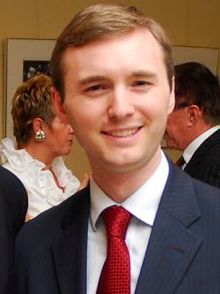
- Tomicah
Tillemann, adviser to Hillary Clinton for civil society and emerging
democracies, supervises NED’s apparatus in the State Department.
Of course, all this is only an attempt at self-justification. The
idea of establishing a democratic mark is not scientific. In some ways,
it is totalitarian, for it assumes that there is only one form of
democratic institutions. In other ways, it is infantile for it
established a list of disparate criteria which it will measure with
fictional coefficients to transform a social complexity into a single
figure.
Furthermore, the vast majority of these studies conclude that it is a
failure: although the number of democracies in the world has increased,
there would be no link between democratic progress and regression on
the one hand and the sums spent by the NSC on the other. On the
contrary, it confirms that the real objectives have nothing to do with
those indicated. However, those running USAID cite a study by Vanderbilt
University, according to which only the NED operations co-financed by
USAID have been effective because USAID manages its budget rigorously.
Thus it is not surprising that this individual study has been financed
by …. USAID.
Be that as it may, in 2003, on its twentieth anniversary, NED drew up
a political account of its action, evidencing that it has financed more
than 6,000 political and social organizations in the world, a figure
that has not stopped increasing from that time. NED claims to have
single-handedly set up the trade union Solidarnoc in Poland, Charter 77
in Czechoslovakia and Otpor in Serbia. It was pleased that it had
created from scratch Radio B92 or the daily Oslobodjenje in the former
Yugoslavia and a series of new independent media in the “liberated”
Iraq.
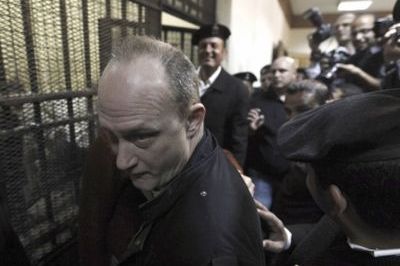
- In
December 2011, Egyptian authorities search the offices of the NDI and
IRI in Cairo. The documents that were seized are most important to
understand US interference since the "nest of spies" was removed from
Teheran in 1979. Charged with spying, the NED leaders are tried. Here:
Robert Becker (Director of NDI, Cairo) at the opening of the trial. The
documents prove that NED is wholly responsible for and manipulated the
pseudo revolution that took place in Tahrir Square. This resulted in
more than 4,000 deaths to hoist the Muslim Brotherhood to power.
Changing Cover
After experiencing global success, the rhetoric of democratization no
longer convinces. By using it in all circumstances, President George
W. Bush has depleted it of meaning. Noone can seriously claim that the
subsidies paid by NED will make international terrorism go away. The
claim that the US troops have toppled Saddam Hussein to offer democracy
to Iraqis, cannot be asserted more persuasively.
Furthermore, citizens all over the world that fight for democracy
have become distrustful. They now understand that the aid offered by
NED and its tentacles is in fact aimed at manipulating and snaring their
country. This is why they are increasingly refusing the contributions
“with no strings or sticks attached” offered to them.
Also, US heads from different channels of corruption have tried to
silence the system once again. After the CIA dirty tricks and the
transparency of NED, they envisage creating a new structure that would
replace a discredited package. It would not be managed by trade
unions, management and the two big parties, but by multinationals on the
model of the Asia Foundation.
In the eighties, the press revealed that this organization was a CIA
cover to fight communism in Asia. It was then reformed and its
management was entrusted to multinationals. (Boeing, Chevron, Coca-Cola,
Levis Strauss etc…). This re-styling was enough to give the impression
that it was non- governmental and respectable – a structure that never
stopped serving the CIA. After the dissolution of Russia, it was
replicated: the Eurasia Foundation, whose mandate extends covert action
to the New Asian states.
Another issue that sparks debate is if the contributions for
“promoting democracy” would have to take the exclusive form of contracts
to carry out specific projects or subsidies with no duty to reach
targets. The first option offers better legal cover but the second is a
much more efficient tool of corruption.
Given this panorama, the requirement laid down by Vladimir Putin and
Vladisl Surkov to regulate the funding of NGOs in Russia is legitimate
even if the bureaucracy they have set up for doing so is outrageous and
difficult to satisfy. The instrument of NED, put in place under the
authority of the US NSC not only fails to support attempts at democracy
all over the world but poisons them.








